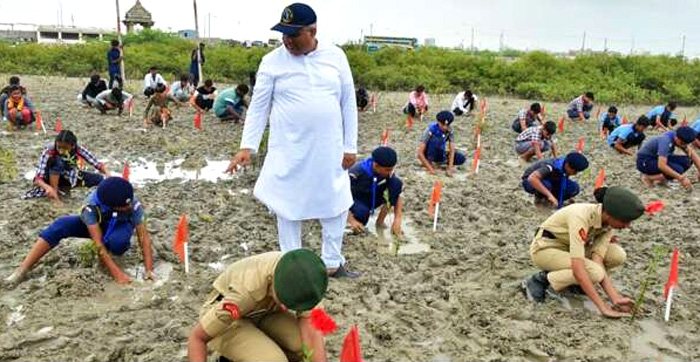Mangroves important to tackle climate change: Yadav at Hariyali Mahotsav
Union Minister for Environment, Forest and Climate Change (MoEFCC), Bhupender Yadav, on Thursday launched the Hariyali Mahotsav, a drive to plant mangroves in Dwarka town of Devbhumi Dwarka district, maintaining that mangroves in coastal areas are very important in tackling climate change.
“We know that in climate change, mangrove plantation is very important in coastal areas. This event has been organised to take this initiative forward,” Yadav told mediapersons after planting a mangrove seedling near the helipad near Rukmini temple on the outskirts of Dwarka.
State Forest and Environment Minister Mulu Bera, BJP MP Poonam Maadam and senior forest officers were present on the occasion. Hariyali Mahotsav is being organised by the state forest department.
Prime Minister Narendra Modi had launched the Union government’s Mangrove Initiative for Shoreline Habitats & Tangible Incomes (MISHTI) programme on World Environment Day on June 5. MISHTI aims at planting mangroves in 540 sq km on coastline, spanning 11 states and two Union territories.
“Under the MISHTI project, work is in progress to increase mangroves cover along the coast. This programme started in Dwarka today,” Yadav said, adding that mangroves will be planted in around 3,000 hectare (100 hectare make one sq km) through initiatives under Compensatory Afforestation Fund Management and Planning Authority, Mahatma Gandhi National Rural Employment Guarantee Act and on public private partnership.
As per the Gujarat Island Development Authority, the state has mangroves spread over 1,175 sq km – the second highest after West Bengal. The Gulf of Kutch and the Gulf of Khambhat have rich natural mangrove forests.
At the event, six private firms, which have their manufacturing facilities in Gujarat, signed separate memorandums of understanding (MoU) with the state forest department, pledging to plant mangroves in cumulative 3,006 hectare (ha) along the coastline of Gujarat. Those who signed MoUs include Digvijay Cement Limited, Nayara Energy Limited, RSPL Limited, Tata Chemicals Society for Rural Development, Cairn Oil and Gas (Vedanta Limited) and Reliance Industries Limited (RIL).
K Ramesh, in charge chief conservator of forests of Marine National Park in Jamnagar said the six companies have agreed to support mangrove plantation in cumulatively 3006 ha and pledged Rs 6 crore for the same. He added that Digvijay Cement has pledged to support mangrove plantation in 40 ha, Nayara in 250 ha, RSPL Limited in 100 ha, Tata Chemicals in 200 ha, Vedanta in 1000 ha and Reliance in 1416 ha.
Maintaining that increasing mangroves coverage is an important aspect of carbon sequestration to fulfill India’s de-carbonisation commitments, Yadav lauded Gujarat for launching a separate drive for mangrove plantation. “Gujarat has the second largest mangroves area and MISHTI is aimed at increasing the mangroves coverage, to conserve biodiversity supported by mangroves and to prevent felling of mangroves,” Yadav told The Indian Express.
Yadav also suggested to explore possibilities of mangroves tourism. Earlier in the day, Yadav went to Dwarkadhish temple in Dwarka. Later in the day, he visited Green Zoological, Rescue and Rehabilitation Centre (GZRRC) and Radhakrishna Temple Elephant Welfare Trust of the RIL in Jamnagar. Being developed by RIL, GZRRC is billed to become the largest zoo of the country.

